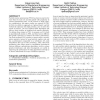1559 search results - page 99 / 312 » The Semantics of Future and Its Use in Program Optimizations |
PLDI
1995
ACM
15 years 1 months ago
1995
ACM
Traditional list schedulers order instructions based on an optimistic estimate of the load latency imposed by the hardware and therefore cannot respond to variations in memory lat...
CIA
2004
Springer
15 years 3 months ago
2004
Springer
Given a specification of communication rules in a multiagent system (in the form of protocols, ACL semantics, etc.), the question of how to design appropriate agents that can oper...
MICRO
2002
IEEE
15 years 2 months ago
2002
IEEE
A value’s degree of use—the number of dynamic uses of that value—provides the most essential information needed to optimize its communication. We present simulation results ...
GECCO
2010
Springer
15 years 1 months ago
2010
Springer
Particle swarm optimization (PSO) has been in practice for more than 10 years now and has gained wide popularity in various optimization tasks. In the context to single objective ...
CGO
2005
IEEE
15 years 3 months ago
2005
IEEE
Data speculative optimization refers to code transformations that allow load and store instructions to be moved across potentially dependent memory operations. Existing research w...

